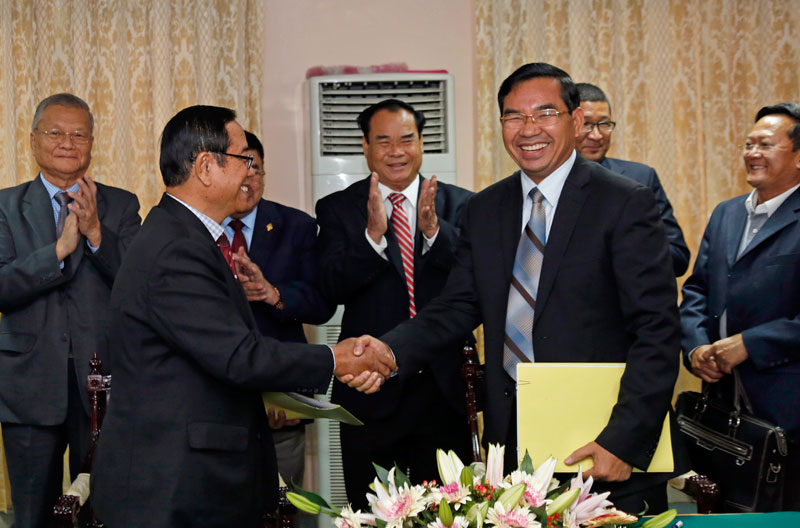The country’s two major political parties signed off on the final draft of a revised and highly controversial election law on Friday, with civil society groups arguing that the bill is unconstitutional due to a provision that restricts their activity during the election campaign period.
The result of months of negotiations between working groups for the ruling CPP and opposition CNRP, the new draft law will be discussed at a public seminar on Monday before being sent in the coming weeks to the National Assembly, where it is expected to receive bipartisan support.

Deputy Prime Minister Bin Chhin, head of the CPP’s delegation in the talks, said following a meeting at the National Assembly on Friday that any changes to the law would have to be made during the legislative process.
“If so, it’s the duty of the National Assembly. If there is any change, it’s the [Assembly] legal commission’s work to decide if it can be changed or not,” he told reporters.
At a ceremony following the meeting, Mr. Chhin sat at a table with Kuoy Bunroeun, the head of the CNRP’s working group, and signed off on a final draft of the law.
The creation of a new election law, along with the formation of a bipartisan National Election Committee (NEC), was at the center of a July deal struck between Mr. Hun Sen and CNRP President Sam Rainsy that ended the opposition’s 10-month boycott of the National Assembly.
During the drafting process, the CPP has proposed a raft of controversial changes to the country’s election law, almost all of which have been accepted by the CNRP in the face of threats from Prime Minister Hun Sen to scrap the process completely and stick with the current, CPP-controlled electoral system.
Only excerpts of the draft law have been publicly released, but Mr. Chhin and Mr. Bunroeun have offered regular updates on its status following biweekly talks in recent months.
Among the more controversial provisions are articles that restrict the participation of civil society groups in election campaigns, allow members of the military and court officials to take part in campaigns, prevent dual nationals from holding positions on the NEC, and a recently added rule that would see parties lose their seats for boycotting parliament after an election.
Mr. Rainsy said on Friday that he did not want to comment on the specifics of the law until the public seminar on Monday, but added that he believed despite the many concessions made by his party, the bill guaranteed improved elections going forward.
“I think that the final version of the law is a compromise, and by definition—by nature—you are never fully satisfied with a compromise,” the opposition leader said. “And I think the same applies to the other side.”
Mr. Rainsy said the law would enable the CNRP and other opposition forces in the country to have a greater chance at electoral success.
“On the whole, I think it will work better for us and we can do much better with the improvement of the law. The CNRP can do much better than before and the force for change in this country could do much better,” he said.
However, election monitors and civil society groups have blasted the new law, focusing their criticism on a provision that prevents civil society groups from “insulting” political parties during election campaigns.
Preap Kol, executive director of Transparency International Cambodia (TIC), which dispatches hundreds of monitors to oversee elections, said the provision violated the constitutional rights to freedom of expression and political participation.
“Debates, public forums, all of these activities will be banned under the law. This violates the Constitution,” he said.
“I have heard that many professional, neutral and independent civil society groups are very disappointed with the articles that restrict their political rights to be involved in the electoral process,” he said.
Lao Mong Hay, a political analyst and adviser to CNRP Vice President Kem Sokha, said that the process of drafting the new law was flawed from the beginning.
“I think right from the start, there were violations of some basic principles already, and as an individual citizen, I felt that the nation shouldn’t have violated such principles,” he said.
Among these violations, he said, were the exclusion of dual nationals and the relatives of political party leaders from holding positions in the NEC. “In both cases, every Cambodian citizen has a right to public service,” he said.
Mr. Mong Hay said that the CNRP had likely decided that having joint control of the NEC—which will have four members from each party and a ninth, neutral member—justified the concessions necessary to push through the reforms.
“Perhaps they are comfortable with power sharing. That is, they have equal seats for members on the NEC and they can have influence and authority in the NEC,” he said.
However, Mr. Kol at TIC said the opposition party might have had unrealistic expectations for the impact of the reforms that it did achieve.
“First of all, I think the CNRP is probably too optimistic about what the election will be like in 2017 and 2018,” Mr. Kol said.
“And I totally disagree that the NEC is independent,” he added. “The new NEC that came into law is a bipartisan body, you cannot use the word independent. But it is acceptable to say it is probably better than the previous NEC.”



